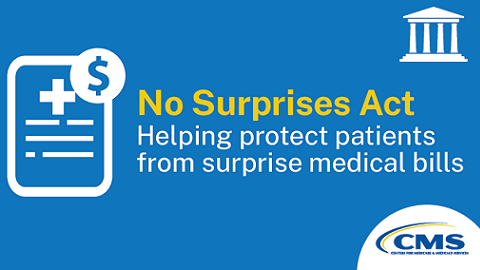from our friends at: www.benefitspro.com
Here’s a surprise: The No Surprises Act (NSA) passed by Congress in 2020 is working. That’s the word from a research report from the Urban Institute.
Several researchers from the Urban Institute and Georgetown University’s Center on Health Insurance Reforms (with backing from the Robert Wood Johnson Foundation) conducted interviews with 32 regulators and stakeholders representing consumers, payers, hospitals and billing companies. The researchers also used data analysis to review the Act’s efficacy since its passage, and found that it seems to be having the desired effect.
“We wanted to see whether it was doing what it should be doing and were pleased to hear that it seems to be working,” said Urban Institute’s Jack Hoadley, the study’s lead author.
The NSA was designed to protect consumers from large, unexpected bills for out-of-network medical services, including life-flight transportation, certain emergency room bills, and procedures done outside the consumer’s home network that the patient did not realize were outside the network.
Hoadley said all parties – providers, payors and service users – have made strides to facilitate the proper operation of the Act. While there was skepticism originally about whether providers and payors would make the system changes required, Hoadley says it appears that most have done so.
Employer- sponsored self-funded plan members are now enjoying the full protection of the Act, he said, since complaints from those members are now handled by federal adjudicators. Previously, self-funded plans had not enjoyed the same protections as fully funded plans, which could appeal “balance bills” to state agencies. States did not have the authority to hear self-funded plan member complaints about the charges.
“There’s no difference now between fully funded and self-funded,” he says. “Providers cannot balance bill the self-funded plans as they were able to do before the act was passed. “The act is good news for all employer plans. The law specifically addressed these issues to make sure they hit all types of insurance.”
Among the study’s findings:
- The Act appears to be protecting patients from the most pervasive forms of balance billing and getting consumers “out of the middle” of payment disputes between providers and payors.
- Physicians, hospitals, and payors have taken critical steps to adjust operational processes to mitigate the risk of consumers receiving balance bills for services covered by the NSA and to pay only in network cost sharing for those services.
- In general, state and federal regulators report relatively few NSA-related inquiries that rise to the level of violating the law.
- Cases related to self-funded plans are regularly transferred “in batches” electronically from HHS to the DOL, where benefit advisors provide further analysis and investigation.

